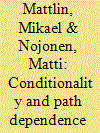| Srl | Item |
| 1 |
ID:
139265


|
|
|
|
|
| Summary/Abstract |
China's long insistence on non-interference in sovereign states' domestic affairs has contributed to a widely held impression that China also lends abroad without attaching policy conditions. In this article, we debunk the notion that China's bilateral lending is entirely devoid of conditionality, by showing that it involves elements of political conditionality, embedded conditionality and cross-conditionality, stemming from the varying concerns of Chinese foreign policy-makers and state-linked lenders. We then draw on the path-dependence literature to explore the possibility that there may also be more indirect forms of conditionality associated with Chinese lending practices. By ‘emergent conditionality’, we refer to structural lock-in effects that may cumulatively restrict or redirect recipient countries' policy-making choices similarly as more direct conditionality would do, even if the PRC government officially shuns conditionality.
|
|
|
|
|
|
|
|
|
|
|
|
|
|
|
|
| 2 |
ID:
086238


|
|
|
|
|
| Publication |
2009.
|
| Summary/Abstract |
The state of democracy in post-communist Europe has been subject to some debate in recent years; but it needs to take account of longer-term trends. The focus here is on how far the EU's political conditionality has contributed to democratic consolidation using an in-depth case study of post-Soviet Latvia. The record of the impacts of conditionality up to EU entry is examined and then attention turns to whether post-accession tendencies have demonstrated any significant changes after the end of Brussels' monitoring. Using a comparative framework, this article shows that the outcome after four years of EU membership is mixed with both positive and negative results. It is concluded that there is no automatic locking-in effect of European integration; and that conditionality assists democratic consolidation more in structural than in attitudinal or behavioural terms.
|
|
|
|
|
|
|
|
|
|
|
|
|
|
|
|
| 3 |
ID:
121835


|
|
|
|
|
| Publication |
2013.
|
| Summary/Abstract |
The following paper uses the case-study of Cameroon to examine how critical donors can shield their close allies from pressure to pursue political liberalization. As the wave of democratic reform swept through Africa in the early 1990s, similar to that going through North Africa and the Middle East today, domestic opposition pushed the ruling clique in Cameroon towards pluralism. However, in this case, instead of encouraging democracy, France helped President Paul Biya to maintain his grip on power. As will be demonstrated, massive amounts of French aid helped the regime survive both internal and external pressure for change. Under a political conditionality approach other secondary donors tried to use their foreign assistance to help push for liberal-democratic reforms in Cameroon. However, such efforts are frequently undermined by what the donor perceives as its self-interest. This research attempts to illustrate this general point by examining the relationship between Cameroon and France and the maintenance of authoritarianism in the defense of common interests.
|
|
|
|
|
|
|
|
|
|
|
|
|
|
|
|